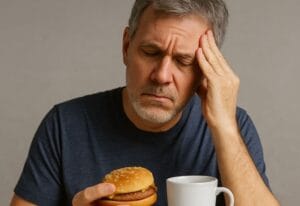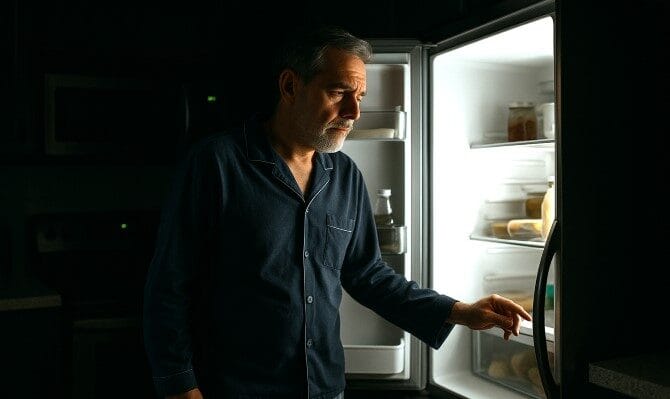Your diet and sleep quality are closely related. What you eat and when you eat can have a huge impact on how well you sleep, especially as you get older..
Eating late, having blood sugar fluctuations, and even having a single drink can keep you body working when it should begin resting. Since your digestion gets worse with age, poor eating habits affect you hard after you hit 50.
Whether you continually wake up at night or feel drained of energy in the morning, your eating habits might be the culprit. In this article we look at common mistakes relating to diet that absolutely destroys your sleep. We’ll also provide suggestions that help you get better rest.

Late-Night Eating Disrupts Deep Sleep
You’re risking a good night’s sleep by eating too close to bedtime. Your body is busy trying to digest your food while it should be slowing down for rest. The thing is, digestion is an active process that takes energy. It keeps your heart rate, body temperature and metabolism elevated all at a time when you should be aiming to fall into deep, restorative sleep. And, as I can attest, eating too close to bed causes acid reflux because you are lying down rather than standing or sitting, as you would after a meal.
Here’s what happens when you eat late:
- Your body stays in “digest mode.” Instead of releasing melatonin and relaxing, your stomach is still digesting food.
- Core temperature increases. At night your body needs a cooler environment to fall asleep. After eating your body’s temperature remains elevated while digesting, making it difficult to fall asleep.
- Heart rate remains higher. Your nervous system stays active keeping your heart rate elevated at a time when it needs to slow for deeper sleep.
- Acid reflux or discomfort becomes much more likely if you lie down too soon after eating, especially for men in their 50s or older..
Better habits:
- Stop eating 3 or more hours before bedtime.
- Choose a lighter dinner – eat lean protein, dark green vegetables, and healthy fats.
- If still hungry later, choose a small protein rich snack like Greek yogurt or a handful of almonds instead of heavy carbs.
- Sleep on your left side, slightly elevated, to reduce the impact of acid reflux.
Choosing the right time to eat in relation to your regular bed time affects your body temperature, how calm you are, and how you digest your feed. All of this greatly impacts when you fall asleep and how deep a sleep you get..
QUOTE“Eating the right foods provides energy for your workout and improves the quality of your sleep. In turn, a sound night of sleep makes you more likely to eat right the next day. This is why the real magic lies at the intersection between eating, moving, and sleeping.” ~ Tom Rath, Eat Move Sleep: How Small Choices Lead to Big Changes. |
Blood Sugar Dips Cause Nighttime Wake-Ups
You may have experienced a sugar high or low while awake. It affects you either energizing you or sapping you of energy. The same can happen while asleep at night. When you eat food that spikes your blood sugar, like dessert or refined carbs, your body reacts a few hours later with a sugar crash. This drop can result in triggering stress hormones which can wake you in the middle of the night.
Here’s what happens:
- Sugar spikes after dinner cause insulin to rise.
- A few hours later, blood sugar levels crash, and the body releases adrenaline and cortisol to correct it.
- These stress hormones increase alertness and heart rate, taking you out of deep sleep—often in the early hours of the morning.
Better habits:
- To stabilize blood sugar, eat protein and healthy fats in the evening.
- Try not to eat sugary desserts, alcohol, or heavy carbs before bedtime.
- Try to eat your meals at the same time to keep you body routine consistent with your sleep routine.
Ensuring you have stable blood sugar levels will help you maintain a steady restful sleep. This ensures your body rests and stays asleep during deep sleep.

Inflammation – The Hidden Sleep Killer
Inflammation is disastrous to sleep. It messes with your joints, digestion and, in my case, my sinuses. When you have a lot of inflammation your body temperature is high, your melatonin production decreases and your ability to fall asleep is made difficult [1][2]. Even if you do, your sleep is restless.
Inflammation is caused at the cellular level where cells that are damaged or threatened release chemicals that ask the immune system to respond. The result is the inflammation process. There are a number of things that can lead to inflammation, including infection but also things we consume.
Here’s what causes the inflammation that impacts your sleep:
- Processed foods and seed oils increase oxidative stress in the body.
- Sugar and refined carbs cause chronic low level inflammation that keeps you on edge.
- Tobacco and Alcohol result in a pro inflammation process which increases depending on how much you drink or smoke.
- Lack of sleep can even cause inflammation
Better habits:
- Eat more anti-inflammatory foods, such as:
- Salmon, sardines, and other fatty fish
- Olive oil, walnuts, and avocados
- Turmeric, ginger, and berries
- Either eliminate or cut back on eating processed foods, deep-fried meals, and sugary desserts.
- Drink plenty of water and eat leafy and colored vegetables
By reducing or eliminating inflammation through a healthier diet and better habits you cool the body down and help the release of more melatonin, both of which are needed to fall into a deep sleep without waking.
Alcohol and Digestion Don’t Mix at Night
Everyone knows that when you drink too much you pass out. The thought is that drinking alcohol leads to a faster and better sleep. While you may feel sleepy when drinking, alcohol doesn’t actually lead to sound sleep. Alcohol makes you feel tired as it acts as a sedative initially but ends up disrupting the natural sleep rhythm your body cycles through, as well as impacts your digestion.
Here’s what happens:
- REM sleep is cut short, which leaves you feeling groggy and unfocused the next day.
- Digestion slows down, leading to bloating, acid reflux, or discomfort when you lie down.
- Blood sugar and hydration change wildly, causing one to have night sweats and to constantly wake-up.
Better habits:
- Stop drinking 3–4 hours before bedtime so you have time to process the alcohol.
- Drink water between each alcoholic drink to minimize the effects and keep you hydrated..
- Stop drinking all together – your health will improve
- If you can’t go without drinking, give your body a few nights off each week to recover.
You’ll fall asleep easier and stay asleep longer especially as your body isn’t working hard to to deal with alcohol and digestion at the same time.

Caffeine Clearance Slows After 50
By no means am I going to suggest foregoing your morning coffee. I wouldn’t do it and there are too many benefits of drinking coffee to give it up. But timing is everything. Having a cup too early (within an hour of waking) and it will mess with your cortisol levels and circadian rhythm. Too late in the day and you can easily destroy your nightly sleep. As you get older your liver isn’t able to process caffeine as quickly as it used to which means it can stay in your system longer. Even a late morning coffee can mess up your sleep and prevent you from falling into or staying in deep sleep.
Here’s what happens:
- Caffeine blocks adenosine, a chemical that builds up through the day and signals your body it’s time to sleep.
- Metabolism slows after 50, so caffeine stays active longer—sometimes for 10 hours or more.
- Hidden caffeine sources like chocolate and green tea can keep you wired without knowing it.
Better habits:
- Stop drinking caffeine by 10 a.m., or switch to decaf.
- Avoid energy drinks all together, but especially in the afternoon or evening.
- Make note of how you feel after drinking a late morning coffee and adjust back your timing as necessary..
Caffeine’s half-life gets longer as we age, so reducing consumption or dialing back your timing can be the easiest ways to improve sleep quality.
DID YOU KNOW?Magnesium deficiency is linked to lighter sleep and waking more often during the night in adults over 40. Magnesium is used in the production of melatonin, a chemical hormone that makes you feel tired [3]. |

Diet and Sleep Quality
You can either calm your system with the food you eat or keep it busy running over time while you try to fall asleep. Making sure you eat the right food at a reasonable time can help your body produce the sleep hormones you need to fall asleep. It can also ensure you blood sugar levels are stable and your digestion doesn’t impact you as you lie down.
Here are some foods that can help you get better sleep:
- Tryptophan-rich proteins: turkey, eggs, and Greek yogurt help your body make melatonin and serotonin.
- Magnesium-rich foods: spinach, pumpkin seeds, and almonds relax muscles and quiet the nervous system.
- Complex carbs: oats, sweet potatoes, and quinoa help steady energy through the night.
- Healthy fats: olive oil, avocado, and salmon reduce inflammation and support hormone balance.
Better habits:
- Eat your biggest meal at around noon to 1 pm when you have the most time for digestion.
- Don’t eat too much for dinner – avoid heavy carbs.
- Give your body at least 3 hours to digest before bedtime.
- Stay hydrated during the day, but limit fluids 2 or 3 hours before bedtime.
When your meals help you fall asleep rather than keep you restless and awake, your body is more able to fall into a deep, sustained sleep and wake up ready to go.
Conclusion
What you eat and when is directly linked to your sleep quality. It determines how easily you fall asleep and how deeply you stay asleep. Late meals or snacks, insulin swings, caffeine and alcohol impact your health and may cause inflammation – a cellular disorder that lead to a number of symptoms that can keep you up all night. There is good news, you can avoid these issues by following the guidelines in the article.
Start one manageable step at a time. Perhaps eat your last meal earlier than you usually do. Then maybe cut out the nightcap you have after dinner each night. You’ll notice your sleep getting better within days. And, given how your sleep quality is a reflection of your health, it seems to be a no-brainer to begin making changes today.
A few simple habits can do more for your sleep than most sleep aids ever will.
Check out Sleep Disruptors: How They Quickly Destroy Your Sleep.







